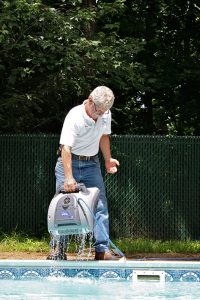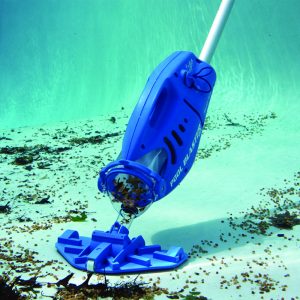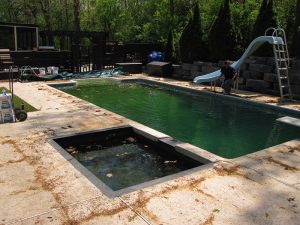Shrewd service professionals are increasing their revenue streams by taking time to look around the backyard for additional sales opportunities. Rather than waiting for things to breakdown, these pros are looking for ways to upgrade the homeowner’s pool experience, while at the same time increasing profits by selling cleaning accessories, replacing/upgrading old equipment, and offering advanced maintenance programs.
To afford a little more time in the backyard, many service companies are incorporating automatic and battery-powered hand-held cleaners into their maintenance routines to provide staff with an extra five to 10 minutes to look around for additional selling opportunities.
Getting started
Once a customer has signed up for a maintenance program, pool professionals generally offer a ‘basic’ service, which includes: pool cleaning; checking water chemistry; and ensuring pool equipment is working properly. For this service, professionals are able to charge a fee and success is generally gauged by the number of pools serviced per day, with the goal of maximizing this number.
By obtaining as many pools as possible in a tight geographic space, service professionals can not only optimize their use of time, but also maximize their revenue earned per hour. However, smart pool professionals also realize a service call cannot be rushed as other potential revenue opportunities can be missed if they do not take the time to ‘look around’ the pool.
Time is money

Automatic pool cleaners can buy time for pool professionals whereby allowing them to find other potential revenue sources in the backyard.
Automatic pool cleaners are a perfect example of a technological advancement that can buy time for pool professionals. By incorporating them into their routine, it provides some time to find other potential revenue sources. Rather than spending more time actually cleaning the pool surface, the automatic cleaner maintains the water, while the technician services the equipment.
Many pool professionals are now carrying battery-powered, hand-held pool cleaners in their trucks to spot clean areas that are regularly dirty, e.g. steps and cuddle coves, which tend to accumulate and show dirt.
“Most of the pools we service are right on the beach and are always filled with sand,” says Chris Morelli of South Strand Pool Maintenance in Surfside Beach, SC. “We have a staff of six and five members of our service crew use a commercial-grade, battery-powered pool vacuum to get sand out of pools.
“Using this type of vacuum saves time so we can get more pools cleaned faster. This is especially important to our business since most of the pools we clean are in rental homes during the summer, which means they need to be cleaned between renters. In some instances, we can hit one pool three to four times in a single week. By using this type of vacuum, we have much more time to pursue other business.”
Backyard Vacations Pools & Equipment in Medicine Hat, Alta., is a construction company that also offers service to customers requesting help in maintaining their pool.
“We are so busy with construction projects that we need all the extra time we can get. Using an automatic pool cleaner when servicing jobs is especially important when I’m working on several pools in the same geographic area,” explains the company’s Russell Koch, who also uses hand-held, battery-powered cleaners when opening and closing pools. “I place the automatic pool cleaner into the pool and return four hours later. It only takes 20 minutes to put the vacuum in and take it out, but I still get my full base rate for an hour of work. It would take at least an hour if I was to remain at the pool to vacuum and clean it manually—with no need to backwash and clean the cartridges.”
Dan Lenz of All Seasons Pools in Orland Park, Ill., agrees.
 “We save at least 10 minutes per pool by using a battery-powered vacuum. Those 10 minutes allow our service professionals to chat with the pool owner about the idea of upgrading their equipment and/or take notes to report back to the store about other items that could be replaced on the pool.”
“We save at least 10 minutes per pool by using a battery-powered vacuum. Those 10 minutes allow our service professionals to chat with the pool owner about the idea of upgrading their equipment and/or take notes to report back to the store about other items that could be replaced on the pool.”

Battery-powered, hand-held pool cleaners can be used to spot clean areas that are regularly dirty.
By saving 10 minutes per pool, the company, which services more than 6,000 customers annually, can yield incredible profits from replacement parts alone. According to Lenz, the top three replacements his company deals in are: changing old fibreoptic lights with new light-emitting diode (LED) fixtures; upgrading pool pumps; and installing salt-chlorine generators. For example, when a service technician has time to see the customer’s pool lighting is not working properly or is emitting a very faint glow, this opens the door to contacting the homeowner and explaining the benefits of replacing their pool lighting, which will not only save electricity, but also provide better illumination, thus enhancing their nighttime pool experience.
“We find that once you replace the lights, it’s easier to start the conversation about using automatic control systems and other automated devices to improve their pool experience, says Lenz. “Automation systems have become a huge revenue stream for our company that simultaneously builds loyalty among our customers as we help them simplify their pool maintenance, and thus increasing the enjoyment of their pool.”
Salt-chlorine generators are the top-selling replacement product for Backyard Vacations. Koch chalks this up to the fact he sets his client’s expectations about how this product provides convenience and not just cost-savings.

By saving 10 minutes per pool service, professionals can take notes to report back to the store about possible items that can be replaced on the pool.
“Salt-chlorine generators improve the swimming experience for the client, while the salt units, which need to be replaced fairly often, provide a great revenue source for us,” adds Koch. “Replacing salt generators yield much greater profits for our company than cleaning pools, but being in the backyard with an automatic cleaner provides us the time to service existing equipment, install a new unit, or even work on constructing a shed or gazebo.”
Sell what the company uses
In addition to the time-saving benefits a robotic pool cleaner and/or hand-held vacuum provides, many pool service companies have sold a number of these units in their stores simply because the pool owner witnessed them being used by the service technician. For instance, those pool owners who need or want to perform spot cleaning between weekly maintenance visits can do so via hand-held, battery-powered vacuums.
Selling robotic cleaners to customers has become more commonplace as well. Lenz says once the customer sees the technician using one and they realize how easy a robotic cleaner is to use, they become appealing to homeowner’s who want to keep their pool as clean as possible between service visits.
According to Koch, more than 50 per cent of his customers who have seen him use an automatic cleaner have purchased a unit from his store.
“I’m happy to sell them the cleaner because I still maintain my relationship with the client for other business,” he adds. “To keep them from going to the Internet to buy the cleaner, we will service any cleaner the company sells; however, we will not service one purchased elsewhere. A happy customer is a loyal, returning customer.”
Specialty chemicals can offer additional revenue
A&M Corsons in Chandler, Ariz., offers its customers a premium pool maintenance program called ‘Never Green Guarantee.’ The company’s target market tends to be those who have had their pool serviced by someone that is not trained in water chemistry, and, therefore, the service is not guaranteed.
“Our service fees start at $85 and can go up to $200 per month for larger, more complex pools,” says the company’s Cerah Gray. “We quote each pool individually based on size, landscaping, equipment, water features, etc.

Some companies offer a swimming pool ‘baby-sitting’ service for those customers who are going on vacation and do not want to return to a green pool.
“When we provide a quote, we include the ‘Never Green Guarantee’ option for an extra $5 to $10 per month (approximately eight to 10 per cent more in most cases), which guarantees the client their pool will not turn green. However, should this happen, we will clean up the pool at no extra charge to the customer by simply using a phosphate remover/enzyme product.”
Those pool owners who have experienced their pool water turning green in the past know it will likely cost $50 to $80 in chemicals alone just to clean up the water.
“We are able to absorb this cost with our customers because we are backed up by the manufacturer of the products we use,” says Gray. “We would not be able to make this guarantee otherwise.”
Underwater Pool Masters, in West Boylston, Ma., has also found success in offering a high-profit service in addition to regular maintenance programs.
“We offer a ‘baby-sitting’ service that has been very successful,” says the company’s Steve White. “This is a service we offer to customers who are going on vacation and do not want to return to a green pool.
White charges a premium for this service and asks the client for ‘free reign’ in terms of treating the pool water as needed while they away to ensure clean, clear water upon their return.
“To do this, we always use a 90-day algaecide to guarantee against algae growth,” he explains. “For example, one week in July we had more than 254 mm (10 in.) of rain in just a few days. This meant we had to drain approximately 10 per cent of the water from most of the swimming pools we service. Rain tends to add phosphates to the pool water, which leads to algae growth—so the use of algaecides and phosphate removers is very important.”
According to White, the profit margins for the ‘baby-sitting’ service his company offers are excellent and the program continues to grow among the company’s customer base, year after year.
Uncovering profit potential
Whether a service company is upgrading pool equipment or simply maintaining water quality, taking the time to look around the backyard for additional sales opportunities—before things breakdown—can pay off.
This article was written by Connie Stephanie Smith and originally appeared on Pool & Spa Marketing [link].
